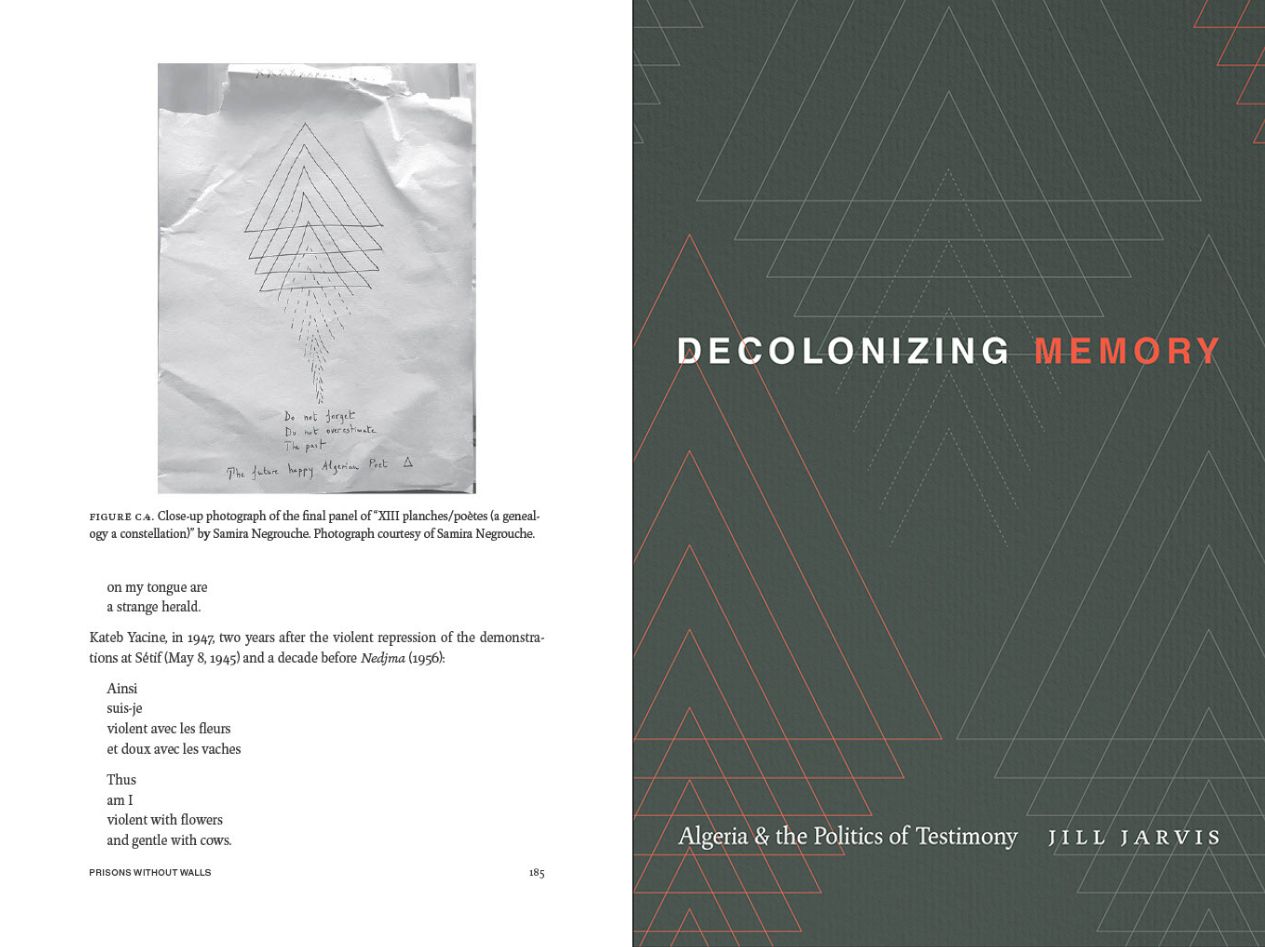Meet the FAS faculty: Jill Jarvis
By Abiba Biao
To nominate an FAS faculty member to be featured in this series, please email fas.dean@yale.edu.
Do not forget
This was the plea that Algerian poet Samira Negrouche’s wrote in the fourteenth panel of her 2018 installation “XXXI Planches/Poètes (a genealogy, a constellation)” displayed at Les ateliers sauvages, an exhibition space in Algiers, Algeria.
The exhibition is an ode to Algeria’s historical colonial resistance, with each of the exhibition’s thirteen previous panels featuring a deceased twentieth century Algerian poet whose literary contributions fueled Algerian independence movement in the 1950s and 60s.
But how exactly do we commemorate the ghosts of the past? How do we not overestimate the colonial atrocities that occurred? What message was Negrouche and other Algerian writers trying to convey about the country’s history?
These are the questions that Jill Jarvis explores in her book: Decolonizing Memory: Algeria and the Politics of Testimony. The title, set against a sleek black cover with triangular motifs in the background, could compel any curious leader to turn the pages to get a deeper look into the rich and tumultuous history of Algeria and its fight against French colonization.
Jarvis is Assistant Professor in the Department of French in the Yale Faculty of Arts and Sciences. Her book, “Decolonizing Memory,” has won several awards including the Samuel and Ronnie Heyman Prize from the FAS.
Jarvis’ interest in French arose from her initial interest in religious studies. After going on trips to Sri Lanka during her undergraduate studies at Whitman College, she became intrigued by the ongoing effects of colonization on previously colonized countries and decided to pursue this interest throughout her MFA at Sarah Lawrence College.
As part of her MFA in creative writing, Jarvis studied Arabic in a translation studies class, where she was introduced to the works of Algerian writer Assia Djebar by her professor Bella Brodzki. Djebar’s writing was a mix of Arabic and French which she at first found “impossible” to read. Soon, Jarvis became more accustomed as she translated Djebar’s writing, strengthening her French and Arabic skills in the process.
That work soon made her fall down the rabbit hole of Algerian culture and its colonial history. She visited the country and made it the focus of her dissertation project during her PhD at Princeton.
“I just became obsessed, more or less with Assia Djebar, with Algeria… and the way that that colonial history and the history of occupation, was filtered into language,” she said.
After her PhD, Jarvis found a new intellectual home as an Assistant Professor at Yale, where she was welcomed with open arms by the French Department. Jarvis credits her colleagues and fellow faculty for being “interested and supportive from the very start,” whether in intellectual discussions in the Whitney Humanities Center or by offering advice on structuring topics in her book.
“I was kind of a loner in terms of my intellectual work, and coming here, and just being appreciated, for the quirky individual ways I do things, and given the kind of space and freedom to figure it out has just been incredible,” she said.
A drawing of triangular motifs from Algerian poet Samira Negrouche’s installation “XXXI Planches/Poètes (a genealogy, a constellation)” on pg 185, which inspired the book’s cover art.
Published in 2021, Decolonizing Memory was the culmination of a decade of work. Publishing the book entailed a long process of writing, researching, and going through the editorial process at the height of the COVID pandemic.
The book’s meticulous attention to the details of literature is is reflected not only in Jarvis’s writing but also in her cover art, which features grey and red triangular motifs that pay homage to Negrouche’s installation “XXXI Planches/Poètes (a genealogy, a constellation).”
“The book really tries to think about the ways that Algerian writers have borne witness to or reckoned with the ghosts of all of the things that have happened in Algeria’s history, and have raised questions of justice in the wake of all of that violence that that have yet to be addressed,” Jarvis said.
Jarvis envisioned the book as depicting Algeria as its own country distinct from its 130 years under French colonization, explaining that, over time, people have begun to discuss French colonies only in relationship to France.
“I tried to really think about Algeria as its own kind of center, and not just locked in like a colonial periphery connection to France,” she said. “That’s also important: to think about the way that Algeria is connected to other places, other languages, and is African. It’s not just a satellite of Europe.”
Jarvis found inspiration in a variety of places while writing, noting that her students were crucial in the book’s conception. She described her approach to teaching classes such as Introduction to Maghrebi Literature, Afterlives of Algeria’s Revolution, and Decolonizing Memory, as a “reciprocal action,” in which she not only imparts information to her students, but learns from them and reflects those connections in her own work.
“I just love the students here,” she said. “They’re these amazing people [who] come to learn things, and they’re in classes, and I don’t feel like I’m teaching them stuff…but it’s more like I put a book on the table for us, a series of books, and listen to what they have to say. And it really has, over the years, become like a conversation.”
Jarvis’s efforts have been celebrated: Decolonizing Memory was awarded two prizes, the first of which was the 2022 Modern Language Association (MLA) Aldo and Jeanne Scaglione Prize. Winning the MLA award was a surprise: Jarvis said that she “almost fell over” when she received the award notification while walking on the street. In addition, she received the FAS Samuel and Ronnie Heyman Prize, awarded in recognition of outstanding scholarly publications or research by a pre-tenure humanities ladder faculty member.
“There’s something really special about it because it’s an acknowledgement from my own institution and from people here that they really value the work I’m doing,” she said. “I was so delighted and honored, honestly.”
Jarvis is now working on her second book, Signs in the Desert: An Aesthetic Cartography of the Sahara. Signs in the Desert will focus on how contemporary writers and filmmakers depict the African Sahara. After learning that the French military detonated seventeen nuclear bombs in the Algerian Sahara between 1960 and 1966, Jarvis felt compelled to design a literary study focusing on desert spaces, wanting to fill a hole in the lack of research and literature on the subject.
“Works of arts are so closely connected to our histories, our ways to interact and connect, and to train our imaginations to think differently,” she said. “I think that that’s sort of the fundamental thing that motivates my teaching, and it motivates my work.”













